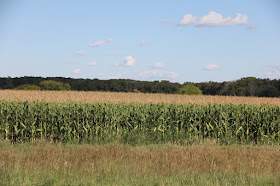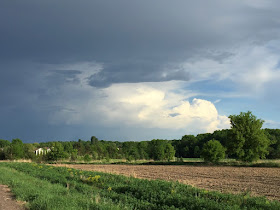 |
| do we really need all the row crops we can produce?
Photo by J. Harrington
|
Much of Minnesota's economy has been built on agriculture. Agriculture is a major contributor to Minnesota's water quality problems, rivers and lakes that don't meet the standards for fishable-swimmable waters, standards that Congress declared should be met back in 1983. The climate breakdown being experienced worldwide is making it more difficult to produce healthy, nourishing foods. The economic models that today control what's produced, how it's produced and to whom it's sold were broken even before the current regime's trade war fiascos. More and more farmers are going broke. Fewer and fewer corporations are controlling the agricultural inputs farmers need.
 |
| there are many different storm clouds over our farm fields
Photo by J. Harrington
|
Some, most?, all?, of the issues associated with agricultural failings also are factors in the much touted "urban - rural divide" that is weakening our democracy. ("A house divided against itself cannot stand." A. Lincoln) Today's discovery of a report by the Urban Institute, Disrupting Food Insecurity, was encouraging, since it provides county-level data for both urban and rural counties. It also lists steps communities can take. Skimming through the report, I came across references to Food Policy Councils. My inquisitive nature prompted a search to see if Minnesota has such an organization. That search led me to a relatively brief (24 page) document titled Minnesota Food Charter. According to their web site, the Minnesota Food Charter has been shared with the public since October 2014. It's only taken me five years to discover it. Better late than never I suppose. Today's posting will help keep track of these resources and, if you're not already aware of them, bring them to your attention. If we manage to create and get implemented a holistic solution to the broken agricultural economy model we now have, we'll be closer to both fishable-swimmable waters and healthy food and communities than if we leave it to corporations primarily concerned with shareholder dividends and executive bonuses. But we'll need more than hope to accomplish our goals.
A Poem on Hope
It is hard to have hope. It is harder as you grow old,
for hope must not depend on feeling good
and there’s the dream of loneliness at absolute midnight.
You also have withdrawn belief in the present reality
of the future, which surely will surprise us,
and hope is harder when it cannot come by prediction
anymore than by wishing. But stop dithering.
The young ask the old to hope. What will you tell them?
Tell them at least what you say to yourself.
Because we have not made our lives to fit
our places, the forests are ruined, the fields, eroded,
the streams polluted, the mountains, overturned. Hope
then to belong to your place by your own knowledge
of what it is that no other place is, and by
your caring for it, as you care for no other place, this
knowledge cannot be taken from you by power or by wealth.
It will stop your ears to the powerful when they ask
for your faith, and to the wealthy when they ask for your land
and your work. Be still and listen to the voices that belong
to the stream banks and the trees and the open fields.
Find your hope, then, on the ground under your feet.
Your hope of Heaven, let it rest on the ground underfoot.
The world is no better than its places. Its places at last
are no better than their people while their people
continue in them. When the people make
dark the light within them, the world darkens.
–Wendell Berry
No comments:
Post a Comment